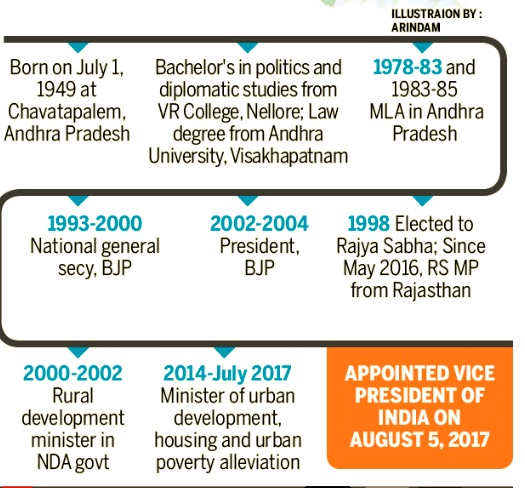M. Venkaiah Naidu
This is a collection of articles archived for the excellence of their content. |
A profile
See graphic

Biography
If Elected As Veep, It'll Mark Return Of A Political Person To Post After 10 Years As an officebearer in the Andhra Pradesh unit of BJP, Venkaiah Naidu undertook an experiment. Breaking a longstanding unwritten rule, he did away with the vegetarian menu at a state executive meeting despite apprehensions that violation of the taboo would lead to protests. The meeting, contrary to expectations, went off smoothly. A majority of participants took to the new menu with relish and Naidu had reason to feel satisfied that he had won a small argument. The change in diet was just a foretaste of far more significant innovations Naidu brought about as he grew in the BJP organisation.
With his election as VicePresident set to mark the return of a political person in the post after a gap of 10 years, Naidu will embark on his second innings in public life at age 68.
After he moved to Delhi, having caught the attention of L K Advani, Naidu soon became popular with the capital's press corps. He was one of the few BJP leaders, barring some like the late Pramod Mahajan, who believed in “selling“ a story to the media in contrast to the dour discipline that marked party officials.
Naidu felt it was well worth the effort if he got even a few paragraphs of the party viewpoint in a negative report and often pursued a proactive path in briefing the media on important issues. As part of Team Advani that included Sushma Swaraj, Arun Jaitley , Ananth Kumar and Mahajan, he gained a national profile.
Though he won two terms in the Andhra Pradesh assembly , Naidu was a popular leader but did not cultivate a mass base. His legislative experience and background as a successful student leader gave him the confidence to speak on the public stage even as he developed into a shrewd organisation man.
He remained close to Advani though he later differed with his mentor over the veteran's opposition to Narendra Modi's projection as BJP's prime ministerial nominee. Naidu, in fact, played a key role in preventing Modi's dismissal as Gujarat CM in 2002 at the much-discussed Goa executive of BJP.
Much later, in 2013, he was vocal in batting for Modi even as significant sections of BJP remained opposed to the Gujarat CM. Later, as information and broadcasting minister, he was prolific in writing on government initiatives and aggressively countering criticism of BJP and Modi on issues such as “rising intolerance“ while also defending the party's nationalist plank. His association with the R S S began way back in 1963 when his enthusiasm to play kabaddi drew him to the local Sangh group which played regularly in his neighbourhood during his boyhood days. A friend took him there and he stayed on.
In 1967, Naidu joined the ABVP as a young student and rose through the ranks to become its national president. The student leader graduated to join the Jan Sangh in 1973 and says he was highly influenced by Jan Sangh leaders Jagannathrao Joshi and Bal Apte.
He replaced Jana Krishnamurthy in 2002 as BJP president when he and Jaitley left the Vajpayee government for organisational duty .He was in the thick of BJP's ill-starred 2004 campaign and had the difficult task of presiding over a fractious meeting of the party national council after the defeat.
Naidu often comes across as combative, but he can be humorous too, tripping over alliterations and acronyms.He is a staunch Sangh man, with a clear grasp of BJP's political ideology. As vice-president and Rajya Sabha chair, he will not be able to change the numbers that will remain adverse. He can be quick with words, but will also need to show subtler skills of negotiation and reconciliation.
